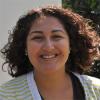I sat in the auditorium as it bustled with excitement, people rushing up and down the aisles, smiling, shaking hands. They were dressed in academic robes, the dhotis and khes of the Jains, impressively tailored suits, hijab, and Southern California slacker gear.
A handful of graduate students sat a row behind me, chattering: “When I was in the bathroom, a Jewish lady let me try on her kip, kippe…kippah? Then a Muslim lady let me try on her shawl, and I got to tell them ‘Praise Jesus for letting this all happen!’ I have to remember that this is an awesome place to be.”
I joined over 250 on the campus of the Claremont School of Theology to celebrate the launch of Claremont Lincoln University. Claremont, a Methodist institution dating back to 1885 partnered with the Islamic Center of Southern California, the Academy for Jewish Religion and the International School for Jain Studies to create a groundbreaking course of study.
Claremont Lincoln will train students who seek ordination as rabbis, imams and pastors in many Christian denominations. The diversity of the school’s faculty, student body and courses of study have earned it the distinguished (albeit unofficial) title of the world’s first interreligious university.
The convocation ceremony featured a string of PhDs, celebrating this new venture with traditionally sung prayer and admonishments from the Quran, Torah and Bible against becoming mired in dogma, doctrine and difference. The call from the pulpit was clear: To work together in pursuit of common solutions, and to recognize God in each other and to put dignity before race, nationality or religion.
While many voices encouraged those gathered to focus on commonalities -- the center of the Venn diagram -- others suggested that we are here for a beginning -- that it’s easy to come together and sing our songs, and say ‘peace.’ Establishing Claremont Lincoln is a success but not a solution unto itself.
Greg Epstein, Humanist Chaplain at Harvard University and national figure in the Humanist movement and a proponent of interfaith dialogue, reminded us of challenges to come.
“Rather than just be ourselves, we are tempted to be symbols first. Some of us try too hard to always agree,” said Epstein. “Some protest too much, that we must always disagree. Many feel torn between loyalty to tradition or family on one hand, and some broader human principle on the other.”
I appreciated his sentiment as working with interfaith experiences has challenged me to think about each of these tendencies in myself.
Ebrahim Rasool, South Africa’s ambassador to the U.S. and an international leader in interfaith cooperation, delivered an address rousing enough to inspire the academics, clerics and predominantly staid middle-age audience to a standing ovation. His challenge to a “transition from competitive religion to cooperative religion, and even comparative religion, to collaborative religion” rang in my ears long after we filed out of auditorium.
As we milled about in our formal wear, greeted by unseasonably muggy weather, I wondered how many among us had sought doctoral degrees in comparative theology.
Who here might be personally challenged by the Ambassador’s assertions? Could Claremont Lincoln lead the charge into new realms of scholarship? Was this truly something new? If I Google “collaborative religion,” what comes up, if anything at all? Am I standing here on this lawn while something truly unique is happening?
I was blessed enough to do graduate studies at Boston College, which is part of something called the Boston Theological Institute. As a B.C. student I had access to classes offered at a number of schools including Gordon Conwell, Boston University School of Theology, Hebrew College, Episcopal Divinity and more.
The exchange of ideas was transformative. Students from different religious and denominational backgrounds had full access to each other’s classes, faculties, ideas, and learning processes. I am still in relationships with my former classmates, now pastors and ministry professionals in a variety of communities. We are still exchanging resources and ideas, coming together for conferences and programs.
I wonder how our experience would have been changed by studying under renowned Muslim scholars. I wonder how my ministry would look now if I had crossed the stage at graduation with future imams and rabbis.
Would our scholarship have become diluted by the pressure to agree? Would studying the Quran have shed a different light on the life of Jesus? Can we move past tolerance to love, from dialogue to collaboration, from comparison to collaboration?
[April Gutierrez is a graduate of Boston College School the Theology and Ministry. She is currently a Campus Minister at Loyola Marymount University.]
Editor's Note: We can send you an e-mail alert every time a Young Voices column is posted to NCRonline.org. Go to this page and follow directions: E-mail alert sign-up. If you already receive e-mail alerts from us, click on the "update my profile" button to add Young Voices to your list.




